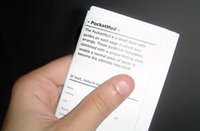A few years back, a singer/songwriter friend of mine wrote, "Failure to live up to a principle doesn't make it untrue. It's your failure to try that will be the undoing of you." I think about that line often, when, say, I'm tempted by the discounts at any of the big box stores that offer lower prices than the mom-and-pops in town, or I find myself debating internally over whether to spend more for a product made in the USA. These days I can't help but feel that every cent I spend has political consequences, and I am ever mindful of the power of my purse strings.
Take the shiny, new Price Chopper that just moved to the outskirts of our village, for instance. There is an independent grocer in town that is within walking distance of everyone who lives in the village. Granted, Domion's is old-fashioned; the linoleum floors are dull, the fluorescents harsh, and I have to check the dates on perishables, but their prices are fair and once we get a house in the village, I won't have to drive my car for a quart of milk. Don't think for one second that Price Chopper hasn't tempted me with the circulars I get every week advertising prices that undercut Domion's, but I've held out. I know it's a tactic to drive out the little guy, at which point those low, low prices will creep higher and higher. One thing that has helped me stay loyal to Domion's is that their workers are unionized and Price Chopper's are not. By patronizing Domion's, I not only support an independent grocer, I'm also supporting my neighbors who work for Domion's as butchers and cashiers, stockers and bookkeepers.
Our current financial circumstances sometimes make my choices seem downright ludicrous, but I've learned to live with less in order to stay within my budget. When I spend two dollars more for organic milk, I have to cut two dollars from some other expenditure. This means buying most of my clothes from consignment shops and shopping for used books on half.com. What distresses me, though, is when I think about how I could cut my overall budget by searching for the biggest bargains. If, say, I did not care if everything I bought was manufactured in China, and I didn't care if the eggs were local and the milk organic, and I didn't care if the dry goods store in town (yes, we still have a dry goods store) folded after a hundred years of business, I could probably pay down my debt faster. But I have to remind myself to think long. After the debts are paid and we own a house and we have a savings of which to be proud, would I still want to live in this place--a place that is extremely affordable--if all of the independent businesses dried up and blew away? Would I want to live here still if every time I needed something I had to get in my car and drive twenty miles? No.
I've heard others who live on tight budgets say that choices like mine are a luxury. I can't argue. All choices are luxury. (Unless, of course, you have to choose between paying rent or paying utilities.) But maybe, just maybe, if we supported our economy and unions and small businesses, our budgets would be less tight. We'd all earn a little more, and while the quantity of goods in our homes might not increase, perhaps the overall quality of our lives would improve.
And then there's the business-owner side of me. One of the reasons why we're in financial dire straights is because we tried to live up to our principles. (See "Facing the Furture with Resolve, Not Regret.") We paid our employees a competitive wage and offered full health care coverage. Do I regret this? No. Would I make different choices if given another opportunity? Yes. I know that many of the personal choices I make are directly tied to my first-hand knowledge of how difficult it is to be a small-business owner in this country. That's why I buy local eggs. That's why I shop at Domion's. That's why I pay more and buy less. Maybe I'm naive or just plain foolish, but I honestly believe that my choices make a difference.











